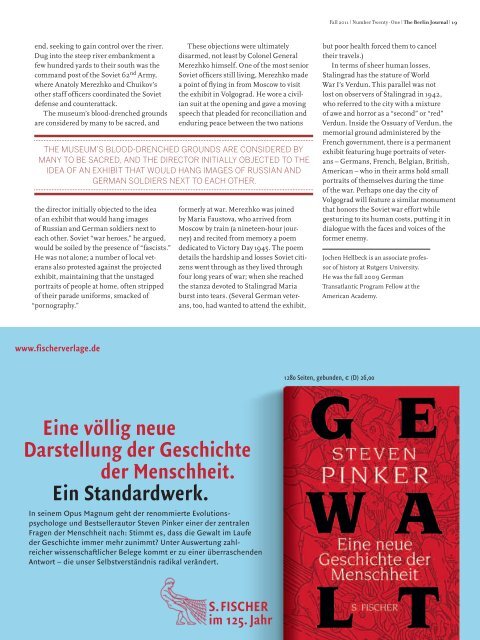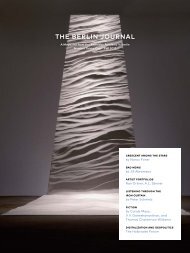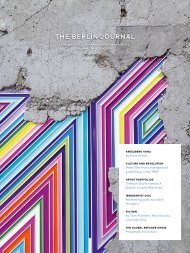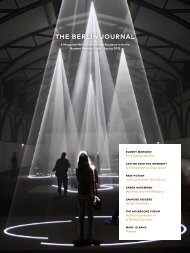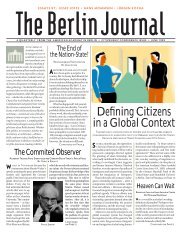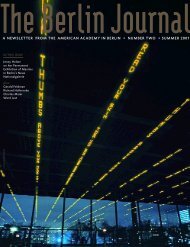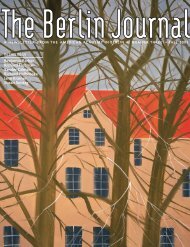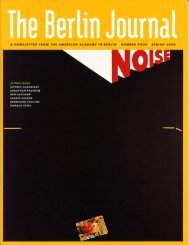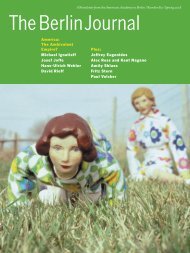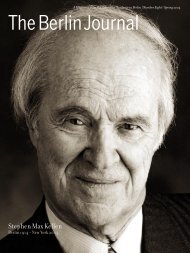Fall 2011 | Issue 21
- No tags were found...
You also want an ePaper? Increase the reach of your titles
YUMPU automatically turns print PDFs into web optimized ePapers that Google loves.
<strong>Fall</strong> <strong>2011</strong> | Number Twenty-One | The Berlin Journal | 19<br />
end, seeking to gain control over the river.<br />
Dug into the steep river embankment a<br />
few hundred yards to their south was the<br />
command post of the Soviet 62 nd Army,<br />
where Anatoly Merezhko and Chuikov’s<br />
other staff officers coordinated the Soviet<br />
defense and counterattack.<br />
The museum’s blood-drenched grounds<br />
are considered by many to be sacred, and<br />
the director initially objected to the idea<br />
of an exhibit that would hang images<br />
of Russian and German soldiers next to<br />
each other. Soviet “war heroes,” he argued,<br />
would be soiled by the presence of “fascists.”<br />
He was not alone; a number of local veterans<br />
also protested against the projected<br />
exhibit, maintaining that the unstaged<br />
portraits of people at home, often stripped<br />
of their parade uniforms, smacked of<br />
“pornography.”<br />
These objections were ultimately<br />
disarmed, not least by Colonel General<br />
Merezhko himself. One of the most senior<br />
Soviet officers still living, Merezhko made<br />
a point of flying in from Moscow to visit<br />
the exhibit in Volgograd. He wore a civilian<br />
suit at the opening and gave a moving<br />
speech that pleaded for reconciliation and<br />
enduring peace between the two nations<br />
THE MUSEUM’S BLOOD-DRENCHED GROUNDS ARE CONSIDERED BY<br />
MANY TO BE SACRED, AND THE DIRECTOR INITIALLY OBJECTED TO THE<br />
IDEA OF AN EXHIBIT THAT WOULD HANG IMAGES OF RUSSIAN AND<br />
GERMAN SOLDIERS NEXT TO EACH OTHER.<br />
formerly at war. Merezhko was joined<br />
by Maria Faustova, who arrived from<br />
Moscow by train (a nineteen-hour journey)<br />
and recited from memory a poem<br />
dedicated to Victory Day 1945. The poem<br />
details the hardship and losses Soviet citizens<br />
went through as they lived through<br />
four long years of war; when she reached<br />
the stanza devoted to Stalingrad Maria<br />
burst into tears. (Several German veterans,<br />
too, had wanted to attend the exhibit,<br />
but poor health forced them to cancel<br />
their travels.)<br />
In terms of sheer human losses,<br />
Stalingrad has the stature of World<br />
War I’s Verdun. This parallel was not<br />
lost on observers of Stalingrad in 1942,<br />
who referred to the city with a mixture<br />
of awe and horror as a “second” or “red”<br />
Verdun. Inside the Ossuary of Verdun, the<br />
memorial ground administered by the<br />
French government, there is a permanent<br />
exhibit featuring huge portraits of veterans<br />
– Germans, French, Belgian, British,<br />
American – who in their arms hold small<br />
portraits of themselves during the time<br />
of the war. Perhaps one day the city of<br />
Volgograd will feature a similar monument<br />
that honors the Soviet war effort while<br />
gesturing to its human costs, putting it in<br />
dialogue with the faces and voices of the<br />
former enemy.<br />
Jochen Hellbeck is an associate professor<br />
of history at Rutgers University.<br />
He was the fall 2009 German<br />
Transatlantic Program Fellow at the<br />
American Academy.<br />
www.fischerverlage.de<br />
1280 Seiten, gebunden, € (D) 26,00<br />
eine völlig neue<br />
Darstellung der Geschichte<br />
der Menschheit.<br />
ein Standardwerk.<br />
In seinem Opus Magnum geht der renommierte Evolutionspsychologe<br />
und Bestsellerautor Steven Pinker einer der zentralen<br />
Fragen der Menschheit nach: Stimmt es, dass die Gewalt im Laufe<br />
der Geschichte immer mehr zunimmt? Unter Auswertung zahlreicher<br />
wissenschaftlicher Belege kommt er zu einer überraschenden<br />
Antwort – die unser Selbstverständnis radikal verändert.<br />
S. FiScher<br />
im 125. Jahr


